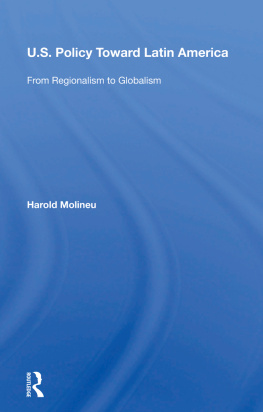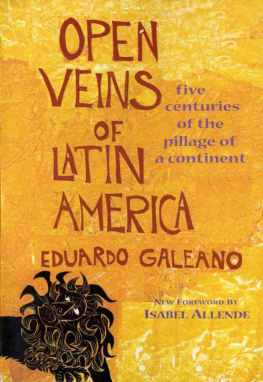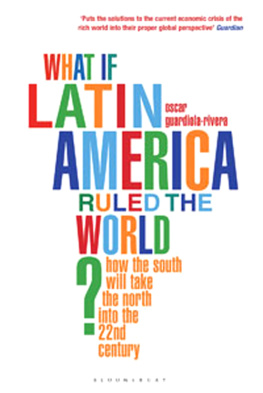Alma Guillermoprieto - The Heart That Bleeds: Latin America Now
Here you can read online Alma Guillermoprieto - The Heart That Bleeds: Latin America Now full text of the book (entire story) in english for free. Download pdf and epub, get meaning, cover and reviews about this ebook. year: 2011, publisher: Knopf Doubleday Publishing Group, genre: Politics. Description of the work, (preface) as well as reviews are available. Best literature library LitArk.com created for fans of good reading and offers a wide selection of genres:
Romance novel
Science fiction
Adventure
Detective
Science
History
Home and family
Prose
Art
Politics
Computer
Non-fiction
Religion
Business
Children
Humor
Choose a favorite category and find really read worthwhile books. Enjoy immersion in the world of imagination, feel the emotions of the characters or learn something new for yourself, make an fascinating discovery.

- Book:The Heart That Bleeds: Latin America Now
- Author:
- Publisher:Knopf Doubleday Publishing Group
- Genre:
- Year:2011
- Rating:4 / 5
- Favourites:Add to favourites
- Your mark:
- 80
- 1
- 2
- 3
- 4
- 5
The Heart That Bleeds: Latin America Now: summary, description and annotation
We offer to read an annotation, description, summary or preface (depends on what the author of the book "The Heart That Bleeds: Latin America Now" wrote himself). If you haven't found the necessary information about the book — write in the comments, we will try to find it.
The Heart That Bleeds: Latin America Now — read online for free the complete book (whole text) full work
Below is the text of the book, divided by pages. System saving the place of the last page read, allows you to conveniently read the book "The Heart That Bleeds: Latin America Now" online for free, without having to search again every time where you left off. Put a bookmark, and you can go to the page where you finished reading at any time.
Font size:
Interval:
Bookmark:
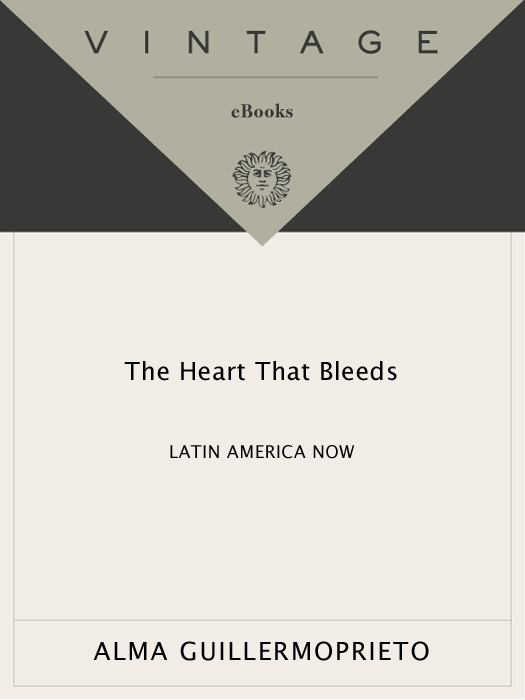
ALMA GUILLERMOPRIETOS
The Heart That Bleeds
Essential.
Joan Didion, The New York Review of Books
Guillermoprietos slices of contemporary Latin America zoom in precisely on a defining encounter of personality then reach authoritatively for a more sweeping truth. {She} burrows unerringly beneath the skin of complex societies.
Boston Globe
Guillermoprietos vantage as a Latin American herself, her interest in long-term cultural and sociological as well as short-term political matters, and her ability as a phrase-maker gives these dispatches an enduring interest.
USA Today
This is the work of a master. She has brought back reports that are unforgettable, brave in their clear-sightedness, but unstinting, too, in their passion and sympathy. The countries of Latin America now have their Orwell.
David Remnick, author of Lenins Tomb
I know few books that so tellingly capture the painful, bizarre and, yes, entertaining ways in which Latin Americans survive the onslaught and challenge of modernity. What most enthralled me was the masterful weaving together of the strands of high political fortune with the everyday teeming lives and dreams of the people themselves.
Ariel Dorfman, author of Death and the Maiden

ALMA GUILLERMOPRIETO
The Heart That Bleeds
Alma Guillermoprieto is a staff writer at The New Yorker. Born in Mexico, she has lived there and in the United States, Colombia, and Brazil. She began her reporting career in 1978, covering Central America for The Guardian and, subsequently, for the Washington Post. Her first book, Samba, was nominated for the 1990 National Book Critics Circle Award. She is the recipient of a 1985 Alicia Patterson fellowship, Columbia Universitys 1990 Maria Moors Cabot Prize, and the 1992 Latin American Studies Association Media Award.
ALSO BY ALMA GUILLERMOPRIETO
Samba
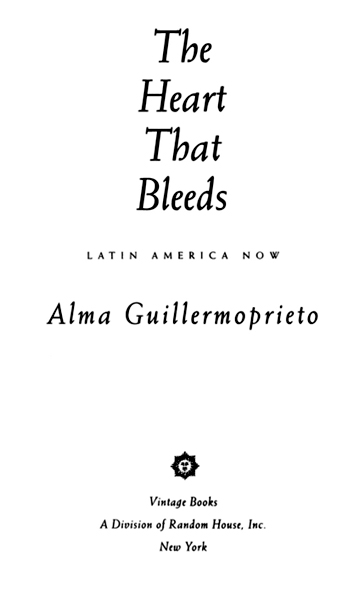
FIRST VINTAGE BOOKS EDITION, APRIL 1995
Copyright 1994 by Alma Guillermoprieto
All rights reserved under International and Pan-American Copyright Conventions. Published in the United States by Vintage Books, a division of Random House, Inc., New York, and simultaneously in Canada by Random House of Canada Limited, Toronto. Originally published in hardcover by Alfred A. Knopf, Inc., New York, in 1994.
All of the essays in this work were originally published in The New Yorker as Letters from the various countries and cities in Latin America.
The Library of Congress has cataloged the Knopf edition as follows:
Guillermoprieto, Alma.
The heart that bleeds: Latin America now / by
Alma Guillermoprieto.1st ed.
p. cm.
eISBN: 978-0-307-78796-5
1. Latin AmericaPolitics and government1980 2. Latin
AmericaSocial conditions 1945
3. Latin AmericaEconomic conditions1982 4. Latin
AmericaMoral conditions. I. Title.
F1414.2.G77 1994
980.033dc20 93-35488
Author photograph Stephen Ferry
v3.1
For Bob, and John
THESE STORIES WERE WRITTEN over a four-year period, on assignment for The New Yorker. They are presented here in the sequence in which it occurred to me to write them, and in that order they represent a certain consistencyand evolutionin my own obsessions: violence, inequality, survival, the faithlessness of politicians, the faithful stubbornness with which people seek to believe. These topics occupy the attention of people in other regions of the world, of course, but it seems to me as a Latin American that for us they are such urgent issues, and so inescapable, that they surface in our dreams and in our needlework, in our love lives, our literature, and even in the way we dispose of our garbage. I am part of a violent and poor culture: Colombia has the highest rate of homicides for any country not at war; in Brazil, fifty-five out of every thousand children born die before they are twelve months old. These are shameful figures, and yet, to the extent that they indicate lives lived on the very edge of all precipices, I have no doubt that they are also part of what makes our world compelling: people from highly civilized countries travel to Latin America seeking passion and intensity; they find it, and stay.
Anyone who had anything to do with Latin America in the nineteen-sixties and nineteen-seventies knew another obsession: the revolution that, to both guerrilla groups and the death squads who opposed them, seemed just around the corner. Now that the Cuban revolutionary epic is staggering to its close, leaving behind neither heirs nor offspring, it is possible to see the latest failed encounter with redemptive apocalypse as one more aspect of a larger, ongoing, and unsolved discussion the continent has had with itself about modernity. The self-awareness acquired with independence from Spain, early in the nineteenth century, has been inseparable from a sense of backwardness and self-doubt, and the social upheavals that have swept through the region since then have at bottom been about the terms under which the Latin-American nations will accede to the modern era, about what aspect of their historical (old-fashioned) identities they will sacrifice in the process, and even about just which modern era it is they will be entering. For indentured peasants in Peru in the nineteen-seventies, to be modern meant simply not to be feudal; for the Lima-based owners of haciendas so large that some even minted their own coin, to be modern meant having the newest television set from Miamiand an indentured servant to provide manicure service during the news hour.
The questions not yet answered in Latin America have to do with a coherent future vision, not only of how the hugely unequal sectors of Latin-American society can all modernize themselves into the same centuryor, in these times of catapulting technological change, into the same decadebut of how they can modernize each other into the same ethical standard and a rough consensus regarding what it is that a modern society owes its citizens, and what those citizens owe each other.
Lacking an appetizing alternative to the lefts dream of a transforming, equallizing revolution, the Latin-American ruling classes of the nineteen-sixties came up with the idea of progress as a way of attaining modernity. The word was almost always linked to the notion of order, as in Ordem e Progresso!, the credo written on the Brazilian flag, which the Brazilian military dictatorship took up as a battle cry. Ordem e progresso meant mega-highways and superconductors and workers marching off to the factory in serried, punctual ranks. The concept was so unappealing that it had to be imposed by force, and so in 1964 Brazil inaugurated the hemispheres era of military rule with a coupan era that ended only a little under three decades later and left a legacy of superhighways in shambles and devastated ecosystems, ruinous debt and workers no more punctual than they ever were, in large part now because the regions bloated cities simply cannot be traversed with any speed or order.
The military dictatorships record is disastrous, but when the Generals withdrew from power throughout the continent nearly all of them reaped the sweet reward of media flattery and official glory, by calling for, and supervising, what became known as free and democratic elections. Here and in the United States, elections were taken as ultimate proof that modernity had arrived at last. Indeed, elections were even taken as proof that democracy had arrived at last. George Bush and the media applauded when Fernando Collor de Mello was elected President of Brazil, in 1990. Unhappily, it cannot be said that Collor was the sleaziest, most shameless con man ever spawned in the swamps of Latin-American politics, because the competition is too stiff. He was, though, according to the hearings that led to his impeachment, a major-league swindler, who betrayed higher hopes than had been placed in any Brazilian ruler before him. In the last four yearsthe period covered by this bookin Venezuela, Peru, Nicaragua, El Salvador, Guatemala, Paraguay, and Haiti elected governments have also been deposed or led their nations economies to ruin, turned dictatorial, or failed to keep basic covenants with their electorates.
Font size:
Interval:
Bookmark:
Similar books «The Heart That Bleeds: Latin America Now»
Look at similar books to The Heart That Bleeds: Latin America Now. We have selected literature similar in name and meaning in the hope of providing readers with more options to find new, interesting, not yet read works.
Discussion, reviews of the book The Heart That Bleeds: Latin America Now and just readers' own opinions. Leave your comments, write what you think about the work, its meaning or the main characters. Specify what exactly you liked and what you didn't like, and why you think so.



